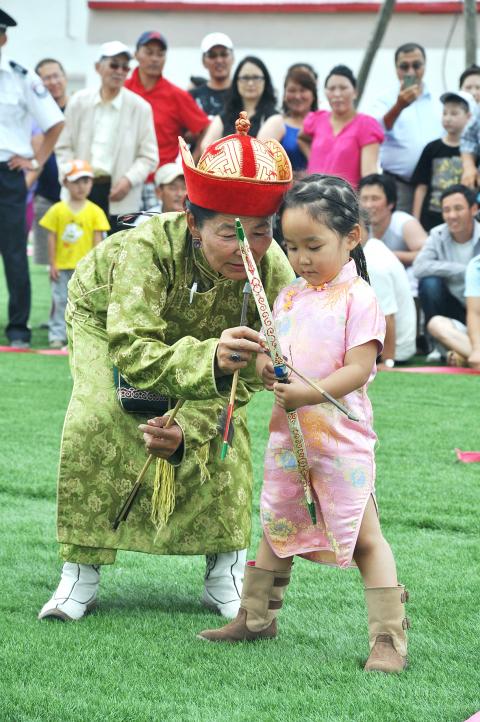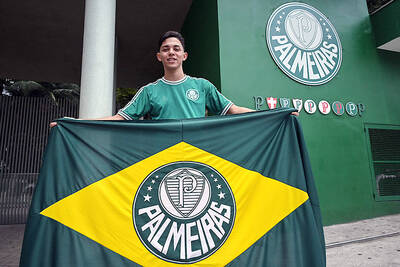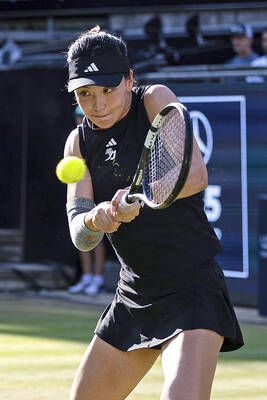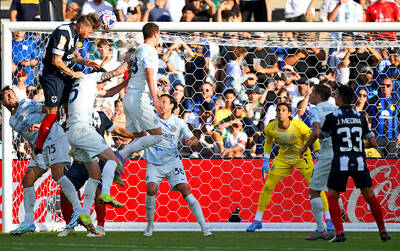In the sand dunes and dirt tracks of the Gobi, Mongolia is staking its place at the heart of the Olympics by providing metal for the medals that will be handed out in London.
Copper and gold that was extracted in a remote corner of the fast-developing country has been transformed into medals — the heaviest ever made for the Olympics — that are being stored at the Tower of London.
While they will become an individual symbol of achievement for the 4,700 athletes who make it to the podiums, sports officials in Mongolia see each and every medal as a source of national pride.

Photo: EPA
“It is a great honor for the Mongolian people, and an example of our involvement with the Olympics and our commitment to the Olympic movement,” Mongolian National Olympic Committee president Demchigjav Zagdsuren said.
Success in Beijing in 2008, when Mongolia won its first two gold medals, had already ramped up enthusiasm for the Olympics.
Steeped in the traditions of their conquering hero Genghis Khan, Mongolians have for centuries favored traditionally “manly” sports of archery, horse racing and wrestling displayed every year at the country’s sports festival, Naadam.
The 800-year old event — which was originally held to test military skills — continues to produce sporting heroes for Mongolians, so it was no surprise that the country’s first gold medals four years ago were in judo and boxing.
However, the traditional nomadic lifestyle from which Naadam developed is beginning to be eclipsed in Mongolia, as the country undergoes rapid change on the back of a spectacular mining boom.
Foreign investment, which mainly comes from huge mining companies such as Rio Tinto, quadrupled last year to nearly US$5 billion, according to government data.
The boom is transforming parts of Mongolia, most visibly in the capital of Ulan Bator, where a surge of construction is underway and the new rich showcase their wealth with the latest luxury cars and fashion accessories.
However, many of the poorest of Mongolia’s 2.8 million people complain that little of that money has trickled down to them and there are concerns that mining is having a damaging effect on the vast country’s environment.
The focal point of the mining frenzy is the Oyu Tolgoi copper and gold mine, located in South Gobi, Omnigovi Province, two hours’ drive from the Chinese border.
The biggest economic undertaking in Mongolia’s history, the mine last year accounted for more than 30 percent of the nation’s total GDP — a year when the country’s economy grew by 17.3 percent.
Oyu Tolgoi, which is controlled by Australian mining giant Rio Tinto, will not become fully operational until next year, with about 15,000 construction workers currently on site.
Exploratory works carried out during the construction phase have provided gold and copper used for the Olympic medals.
Rio Tinto supplied the metals for the medals from two of its mines — one in Mongolia and the other in the US — as part of a sponsorship agreement with the Olympic organizers.
The mining giant supplied eight tonnes of gold, silver and copper for the medals from Oyu Tolgoi and the Kennecott Utah Copper Mine in Salt Lake City, Utah.
The metal was transformed into flat discs — known as blanks — at a range of plants in Europe before they were delivered to the Royal Mint in Wales.
The blanks were then molded to meet the designs specified by London 2012 and the International Olympic Committee (IOC).
The medals are the heaviest ever made for the Olympics, weighing 0.375kg to 0.4kg. They are 85mm in diameter and 7mm thick.
There are high hopes that some of the 29 Mongolia athletes going to London will return with metal originally dug out from their homeland, helping Mongolia make its mark on the international stage through sport as well as economics.
“We hope to win more medals in the four kinds of Olympic sports that Mongolia excels in, judo, shooting, wrestling and boxing. And we want to defend our two gold medals that we won in London,” Zagdsuren said.
Indeed, the level of expectation in Mongolia for the nation to take its place on the world stage is revealed in a memorandum erected in the tiny Olympic museum in Ulan Bator.
The document, signed by IOC chief Jacques Rogge and Mongolian President Tsakhia Elbegdorj, outlines ambitions for the country to stage its first East Asian Games by 2017, its first Asian Games by 2018 and its first Olympics by 2040.
Breakneck development has seen the remote and sparsely populated country set its sights high.
“I think that Mongolia is already an Asian tiger, in that it has one of the fastest growing economies in the world, but the medals definitely add some more spice to the story,” said the president of the Oyu Tolgoi mine, Cameron McCrae.

Brazil has four teams, more than any other country, in the expanded Club World Cup that kicked off yesterday in the US, but for SE Palmeiras, the competition holds a special meaning: winning it would provide some redemption. Under coach Abel Ferreira since 2020, Palmeiras lifted two Copa Libertadores titles, plus Brazilian league, cup and state championships. Even before Ferreira, it boasted another South American crown and 11 league titles. The only major trophy missing is a world champions’ title. Other Brazilian clubs like Fluminense FC and Botafogo FR, also in the tournament, have never won it either, but the problem for Palmeiras

Lionel Messi drew vast crowds and showed flashes of his brilliance when his Inter Miami side were held to a goalless draw by African giants Al-Ahly as the revamped FIFA Club World Cup got off to a festive start on Saturday. Fans showed up en masse for the Group A clash at the Hard Rock Stadium, home to the NFL’s Miami Dolphins, but Messi could not fully deliver, his best chance coming through a last-second attempt that was deflected onto the crossbar. Inter Miami next face FC Porto on Thursday in Atlanta, while Al-Ahly, who benefited from raucous, massive support, are to

Twelve days after winning her second Grand Slam title at the French Open, Coco Gauff fell at the first hurdle on grass in Berlin on Thursday as beaten Paris finalist Aryna Sabalenka advanced to the quarter-finals. Recipient of a first round bye, American Gauff lost 6-3, 6-3 to Chinese qualifier Wang Xinyu as world number one Sabalenka beat Rebeka Masarova 6-2, 7-6 (8/6) in her second round tie. Winner of 10 main tour titles, including the US Open in 2023 and the WTA Finals last year, Gauff has yet to lift a trophy in a grass-court tournament. “After I won the first

Sergio Ramos on Tuesday outfoxed two Inter players and artfully headed home the first goal for Monterrey at the FIFA Club World Cup. The 39-year-old Ramos slipped through the penalty area for the score just as he did for so many years in the shirts of Real Madrid and Spain’s national team, with whom he combined smarts, timing and physicality. Ramos’ clever goal and his overall defensive play at the Rose Bowl were major factors in Monterrey’s impressive 1-1 draw against the UEFA Champions League finalists in the clubs’ first match of the tournament. “There is always a joy to contribute to the